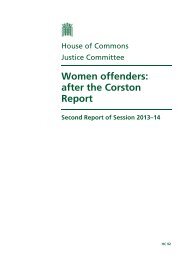Parental socialisation effort and the intergenerational transmission ...
Parental socialisation effort and the intergenerational transmission ...
Parental socialisation effort and the intergenerational transmission ...
- No tags were found...
You also want an ePaper? Increase the reach of your titles
YUMPU automatically turns print PDFs into web optimized ePapers that Google loves.
1. Introduction.Preferences <strong>and</strong> attitudes such as risk tolerance, patience <strong>and</strong> <strong>the</strong> propensity to trust areimportant determinants of individual choices <strong>and</strong> outcomes across a range of domains (e.g.Cramer et al., 2002, Anderson <strong>and</strong> Mellor, 2008, Dohmen et al., 2011). There has beengrowing interest in underst<strong>and</strong>ing <strong>the</strong> development <strong>and</strong> determinants of <strong>the</strong>se preferences.Moreover, many choices, such as occupation or education, <strong>and</strong> outcomes such as earnings, arehighly persistent across generations within families (Black <strong>and</strong> Devereux, 2011). This drawsattention to <strong>the</strong> family. While <strong>intergenerational</strong> persistence may partly reflect <strong>the</strong><strong>intergenerational</strong> <strong>transmission</strong> of ability (Black, Devereux <strong>and</strong> Salvanes, 2009), recent<strong>the</strong>oretical models emphasize a key role for <strong>the</strong> <strong>intergenerational</strong> <strong>transmission</strong> of preferences<strong>and</strong> attitudes in <strong>the</strong> persistence of choices <strong>and</strong> outcomes (Bisin <strong>and</strong> Verdier, 2000, 2001;Doepke <strong>and</strong> Zilibotti, 2012; Dohmen et al., 2012). Thus, empirical evidence is needed on <strong>the</strong>extent to which <strong>and</strong> <strong>the</strong> mechanisms by which attitudes <strong>and</strong> preferences are transmitted acrossgenerations.In this paper we study <strong>the</strong> <strong>transmission</strong> of risk preferences in a unique survey of mo<strong>the</strong>rs <strong>and</strong>children in which both participated in an incentivized risk preference elicitation task. Thisstudy builds on <strong>the</strong> previous literature in a number of ways. First, <strong>the</strong> children we study arejust 7 to 8 years old. Second, <strong>the</strong> risk preferences of both mo<strong>the</strong>rs <strong>and</strong> children are measuredin an incentivized risk task (ra<strong>the</strong>r than by survey measures that have been shown to becorrelated with preferences elicited in an incentivized task). Third, <strong>and</strong> most importantly, <strong>the</strong>mo<strong>the</strong>rs <strong>and</strong> children we study are participants in an interdisciplinary longitudinal study ofchild development. Consequently, detailed information is available on children'scharacteristics <strong>and</strong> upbringing, <strong>the</strong> mo<strong>the</strong>rs' parenting behaviours <strong>and</strong> attitudes, as well ashousehold <strong>and</strong> regional characteristics. This information is collected prospectively <strong>and</strong>contemporaneously (not retrospectively), <strong>and</strong> contains measures which capture <strong>the</strong> degree of<strong>effort</strong> which <strong>the</strong> parent exerts to raise <strong>and</strong> socialize <strong>the</strong> child. This is particularly interestingbecause recent <strong>the</strong>oretical models of preference <strong>transmission</strong> assume that <strong>the</strong> <strong>transmission</strong> isinfluenced by parental investment choices (see Bisin <strong>and</strong> Verdier. 2011. for a review of thisliterature).We find that risk preferences are correlated between mo<strong>the</strong>rs <strong>and</strong> children when <strong>the</strong> childrenare just 7 to 8 years old. In our data, <strong>the</strong> correlation is driven entirely by mo<strong>the</strong>rs <strong>and</strong>2
















